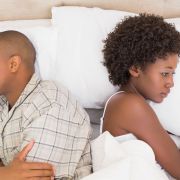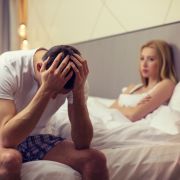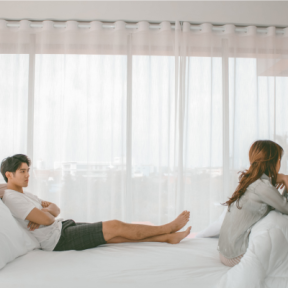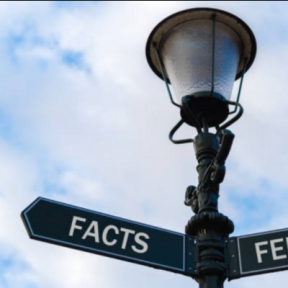
Low Sexual Desire
People normally differ in their degree of sexual appetite. There is no single standard of sexual desire, and desire differs not only from person to person but also for the same person over the course of a relationship.
One of the most common sexual complaints among couples is a disparity in sexual desire. Sexual desire can be low for a variety of reasons, many of them psychological and interpersonal. But that doesn't necessarily make it a disorder. It becomes a diagnosable condition only when it diminishes the quality of one's life and creates distress, or when a disparity arises in the sex drives of partners, evolving into a matter of unresolved contention in the relationship.
Loss of sexual desire can both result from relationship problems and cause them. Childhood sexual abuse also may inhibit sexual desire later in life.
Contents

What constitutes "low" (or hypoactive) sexual desire is relative. Partners who use the degree of sexual desire experienced early in a relationship as a standard of comparison may label as a problem the drop in sexual desire and activity that often accompanies long-term partnerships.
Further, a person who experiences low sexual desire that is problematic relative to one partner may not experience any disparity in desire with a different partner. What is designated as one partner's low libido may more accurately reflect a hyperactive sex drive in the other partner. Sexual desire and responsiveness normally differ between men and women, and assumptions about sexual equivalency may falsely suggest the existence of hypoactive desire disorder.
The single biggest psychological cause of hypoactive sexual desire may be depression. Fatigue is up there, too, and a highly stressful lifestyle can have an impact on sex drive. People who have body image problems may also experience a lack of sexual desire. Decreased sexual desire is a well-established and common side effect of treatment with antidepressant drugs.
Loss of sexual desire usually manifests as a lack of response to a partner's overtures for sexual activity. Symptoms of low sexual desire might also include sexual arousal disorder, erectile dysfunction, anxiety inhibiting sexual performance, a low level of sexual interest, a recurring lack of desire, and the absence of sexual fantasies.
How much sex—and desire for sex—is “healthy” depends on the individual. Levels of sexual desire can change for various reasons, and decreased desire doesn’t necessarily cause distress, though it can.
While a decline in sexual interest is normal to some degree in many long-term relationships, experts report that resentment is a major cause of libido loss, and it strikes men as well as women. Anger at a partner—for being overly critical, for being too dominant or too passive, for ignoring one's needs, for any reason at all—can dampen sexual desire, and is a culprit that couples therapists often look to address when discussing one person's lack of interest.
People who constantly sacrifice their own needs to make their partner happy are often miserable and tend to suffer from low self-esteem; it is also unlikely that their partner realizes or appreciates their sacrifice. In a healthy relationship, both partners must find a balance where they are getting their sexual needs met.
Explain why you’re saying no, and schedule time for sex in the near future. This reassures your partner that the rejection is not a sign of larger problems in the relationship. Find nonsexual activities to do with your partner that can reinforce your bond. The next time you’re feeling in the mood, don’t be afraid to initiate.
Many problems with low sexual desire can be traced back to adverse childhood experiences. Victims of abuse and those who have experienced trauma may come to associate sexual intimacy with a sense of danger or threat. This negative conditioning can make it difficult to connect with partners and enjoy sex.
Religion often teaches that masturbation and sexual activity outside of marriage are wrong in hopes of preventing promiscuity, supporting monogamy, and emphasizing traditional family life. Children and teens learn to associate sex with feelings of shame and guilt from a young age. This can lead to loss of libido, difficulty getting and staying aroused, and other sexual problems in adulthood.
A person’s gender is more likely than their sexual orientation to impact their level of desire. In general, men have higher and more consistent sex drives than women, regardless of their sexual orientation.

Physical causes of low libidos, such as changes in endocrine hormones, must be ruled out first. Most often, the causes of low sexual desire will not be revealed by medical or laboratory tests.
Sometimes, the best treatment for low sexual desire in either partner is counseling—to resolve overt conflicts, hidden resentments, power struggles, or other interpersonal barriers to erotic interest. Since depression is a frequent cause of diminished desire in both men and women, treatment of depression is another important path to the resolution of desire problems. Psychological therapies, such as cognitive-behavioral therapy, may not only be more effective than pharmacotherapy in relieving depression, but they also do not interfere with libido, as many psychoactive drugs do.
There is no magic pill for restoring sexual desire in women, nor is there likely to be. Perhaps the most effective route is educating both men and women about how women actually become aroused. One treatment of hypoactive desire in women that is proving highly effective utilizes mindfulness to connect bodily sensations of arousal with psychological arousal.
Among men, a drop in testosterone levels can profoundly impact sexual desire, and for some men, treatment with testosterone may help restore desire.
Not generally. The amount of sex that a person has doesn’t matter nearly as much as the quality and how it makes them feel. Intimacy should make you feel good and improve your connection with your partner; it shouldn’t feel like a chore or an obligation to endure.
Sex is more frequent and easy in the honeymoon phase of a relationship. As time goes on, the happiest couples subscribe to “sexual growth beliefs”; they believe that sexual attraction can be strengthened with effort. Dissatisfied couples frequently have “sexual destiny beliefs” and assume a relationship that takes work isn’t meant to be; they generally report less relationship satisfaction.

Sexual desire is now believed to be more biologically driven among men than among women. It is spontaneous and generally considered the first step toward intimate feelings and behavior. Loss of sexual desire and sexual inhibition may be more common among women—but these problems are not unknown among men.
Men often experience decreased sex drive in response to heavy alcohol consumption. Erectile dysfunction, performance anxiety, medical conditions, medications, and stress can all diminish sexual desire. While some clinicians report that men's excessive use of pornography leads to diminished sex drive within a relationship, some studies show mixed positive and negative effects of pornography on relationships, and others find no negative impact at all.
Men are more readily physiologically aroused than women, and for them, desire is tied tightly to this arousal.
Some common reasons why men experience a decreased interest in sex include: lack of emotional connection, repeated sexual rejection, stress, feelings of shame and guilt about their sexuality, and various health issues. Low sexual desire can also be the side effect of a medication or the result of a sexual problem, such as premature ejaculation or erectile dysfunction.
Men are more likely to experience spontaneous desire; this is where sexual desire is followed by arousal (i.e., the physiological changes associated with sexual activity). Women, on the other hand, are more likely to be turned on when experiencing responsive desire, where sexual desire follows physical arousal. Understanding these gender differences can help couples get on the same page sexually.
Men’s sexual desire for their mates can vary tremendously during pregnancy. Some men are more aroused and want more frequent intercourse; others are turned off, especially late in the pregnancy, and are fearful of hurting the fetus with sexual activity.

Sexual desire in females is both more complex and more fragile than it is in males. It is generally more variable, and women may find themselves more easily turned off, depending on their hormonal state, how they feel about themselves and their partners, and other events in their lives, to say nothing of a partner's lovemaking style and technique.
But experts agree that, in general, sexual desire is lower among females than among males, so a further drop in female desire for any reason may be more problematic in relationships. Because female sexuality is multifactorial, involving various combinations of mental, physical, and social factors, there is no one, simple solution for treating women who experience low sexual desire.
Among women, sexual desire is typically more psychological and situational, influenced by how they feel about their bodies as well as the quality of relationship with their partner. Moreover, women often do not experience desire until after they are genitally aroused, and arousal may require an extended period of foreplay.
Women may experience a reduced interest in sex based on many different factors. Some of the most common include feeling distressed over a desire discrepancy in a relationship, not taking enough time to “warm-up” sexually, either not knowing or not asking for what they want, and struggling with the harmful myth that “good girls don’t like sex.”
The drop in hormones at menopause can make sex more painful, reducing women’s interest in it. Supplements can help. Female sexual desire can also be increased by having a responsive partner who shows a genuine interest in her thoughts and feelings. Post-menopause, women are more likely to leave their inhibitions behind and clearly communicate what they want sexually to their partner.
Female sexual desire ebbs and flows throughout pregnancy. In the first trimester, hormonal changes and morning sickness may decrease a woman’s desire. Her libido may rebound in the second trimester, accompanied by orgasms that are more satisfying than usual, only to dip low in the third trimester. When the baby first arrives, a woman may be too exhausted to be turned on sexually by her partner.

The physical changes that accompany aging don't necessarily lead to declining sexual desire and function. The level of sexual activity maintained over time varies and depends on many factors. These include physical and mental health, personal interest in sexual activities, comfort with one's own sexuality, and intimate relationship status.
Problems with diminished libido, erectile dysfunction, and other age-related changes are common, as are side effects from chronic health conditions and some commonly used medications that affect sexual function. Negative cultural attitudes and myths can also interfere with the pursuit of satisfying sexual activity among older men and women. When properly addressed, most of these problems are not insurmountable and can often be resolved with the appropriate treatments and therapies.
Interest in sex naturally ebbs and flows over time. Having reasonable expectations can help couples better navigate these differences. Increased autonomy and openness to experiences can enhance sexual desire. Being responsive is also a major turn-on. Egalitarian couples who contribute equally to the relationship tend to be more satisfied sexually than couples where one party is doing significantly more work.
Absolutely. The key is not to take it personally. Sexual desire naturally declines with age, but couples can make changes to increase sexual satisfaction. They can take their time and enjoy the experience of touching each other’s bodies. They can stop focusing on intercourse as the only way to reach orgasm and appreciate a wider range of sexual activities.
While sexual satisfaction generally declines over time, relationship satisfaction tends to increase. Starting off with a higher level of sexual satisfaction can be a protective factor and help couples maintain relationship satisfaction longer. In addition, women’s relationship satisfaction tends to last longer than men’s.














